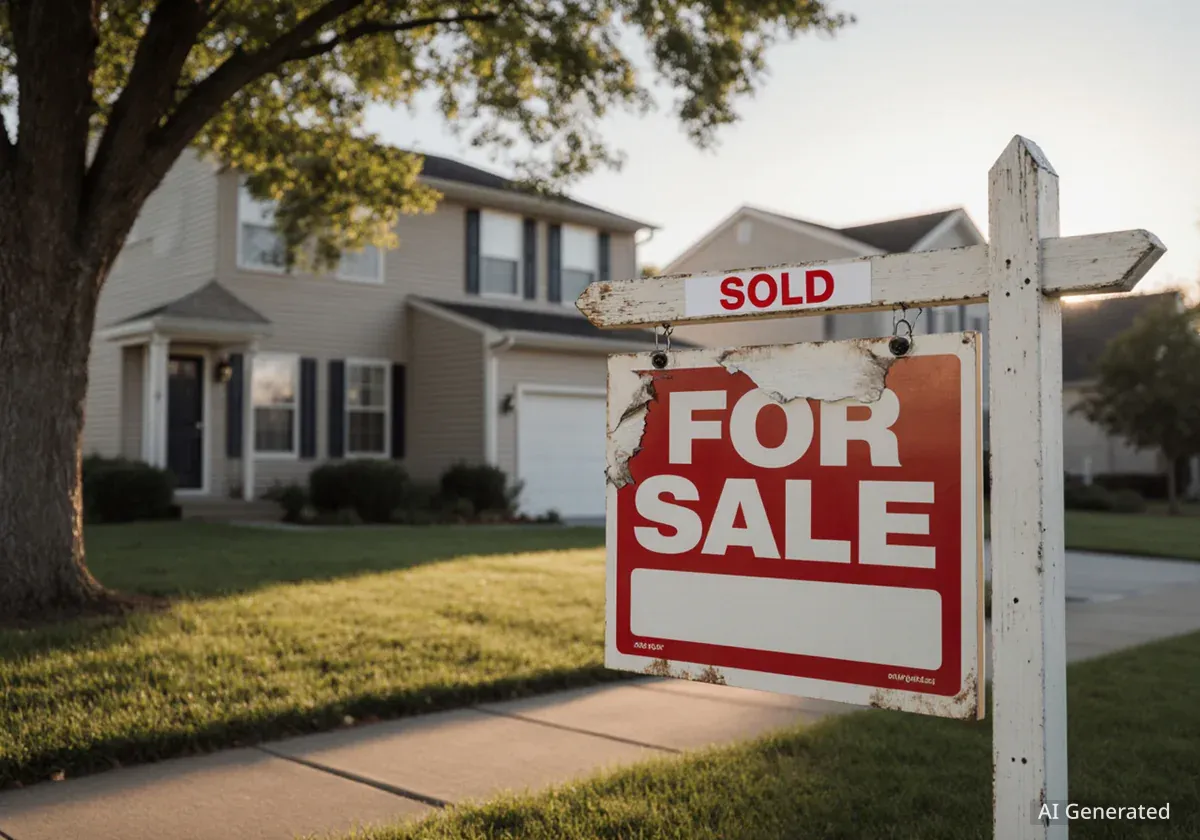A stark division is emerging in the American real estate landscape, with Florida's once-feverish market showing signs of a significant slowdown while bidding wars make a comeback in key northeastern suburbs. According to real estate expert Erin Sykes, the founder of SYKES Properties, the two regions are experiencing entirely different economic realities.
Speaking at the ResiDay conference, Sykes described the current situation in the Sunshine State as a market correction after a period of intense activity. In contrast, she noted that commuter towns in the Northeast are seeing renewed competition among buyers, creating a split personality for agents working across both regions.
Key Takeaways
- Florida's housing market is experiencing a slowdown, with overall home prices falling 5.4% year-over-year.
- In contrast, northeastern commuter suburbs like Monmouth County, N.J., are seeing the return of bidding wars.
- The Florida market is bifurcated: single-family homes remain strong while the condo market faces significant headwinds.
- Real estate agents working in both markets face jarringly different conditions, from negotiating steep discounts in Florida to managing multiple offers in the Northeast.
Florida's 'Toxic Relationship' with Real Estate
After years of explosive growth that saw Florida dubbed "Wall Street South," the state's housing market is now in a period of withdrawal. Sykes characterized the dynamic in stark terms.
"Living and working in Florida is like being in a toxic relationship," she explained. "Just a couple years ago, we were being love-bombed and told how great we were. Now we’re being told, ‘Oh, you’re too expensive,’ and kind of being discarded."
This shift represents a significant change from the pandemic-era boom. The influx of remote workers and relocating companies sent prices soaring, with some areas like Palm Beach seeing home values jump by as much as 200% in just a few years. Now, the market is navigating a hangover from that frenzy.
However, Sykes suggests this isn't a repeat of the 2008 crash. She described the current cycle as having "flatter waves" than previous boom-and-bust periods. A modest price correction is seen as a sign of stabilization rather than a collapse.
By the Numbers
Despite recent gains, Florida's overall home prices have declined 5.4% year-over-year. However, Sykes noted that for a homeowner whose property appreciated 25%, a 5% pullback is relatively minor and points toward a more stable, sustainable market.
The Northeast Heats Up Again
While Florida cools, a different story is unfolding in the suburbs surrounding major northeastern cities. In commuter-friendly areas such as Monmouth County, New Jersey, and parts of Long Island, competition for homes is intensifying once again.
Bidding wars, a hallmark of the recent housing boom, have returned. According to Sykes, buyers in these regions are still prioritizing space and access to top-tier school districts, driving demand for single-family homes on larger lots.
This resilience in the Northeast stands in sharp contrast to the negotiating happening in Florida. Sykes described the professional whiplash of moving between the two markets.
"It’s like having a multiple personality disorder," she said, explaining that in Florida, an agent is "trying to really push and pull and drag deals together, you’re getting discounts of 5%, 10%, 20% off list price," only to shift to managing a bidding war in the Northeast.
A Divided Market Within Florida
The slowdown in Florida is not uniform across all property types. A clear division has appeared between the market for single-family homes and the condo market.
Single-Family Homes Remain Resilient
Demand for single-family houses remains robust. This is largely driven by families relocating from dense urban centers like Chicago and Manhattan who "wanted their own space." This demographic continues to seek the lifestyle that single-family properties in Florida offer, propping up values in that segment.
Condos Face Mounting Pressure
The condo market, however, is what Sykes identified as "really what has been driving down the Florida market." Condominiums are facing a perfect storm of challenges that are depressing prices and deterring buyers.
Post-Surfside Regulations
In the wake of the tragic Surfside condo collapse, Florida implemented stricter building safety regulations. These new mandates require more rigorous inspections and certifications, leading to costly repairs and upgrades for many older buildings. These expenses are often passed on to owners through large special assessments.
These new costs, which can sometimes reach six-figure amounts per unit, are a major deterrent for potential buyers and a financial strain on current owners. The combination of hefty assessments, rising insurance premiums, and new structural integrity rules has created significant downward pressure on condo values.
Despite these challenges in the resale market, Sykes pointed out that pre-selling for new-construction condo developments continues at a healthy pace, with West Palm Beach in particular seeing a number of significant projects underway.
Navigating Two Competing Realities
The current environment highlights a broader divergence in the national housing market. Regions that overheated during the pandemic-fueled migration boom are now experiencing a necessary correction, while more traditional markets are returning to familiar patterns of supply and demand.
For agents, buyers, and sellers, this means that national headlines don't tell the whole story. The reality on the ground can change dramatically from one state to another, and even from one property type to another within the same city.
Sykes concluded that while Florida's market may be challenging, its cyclical nature is part of its identity. "Florida," she remarked, "you have to always take with a grain of salt." The current cooling period, while jarring for some, may ultimately lead to a more balanced and sustainable market in the long term.





